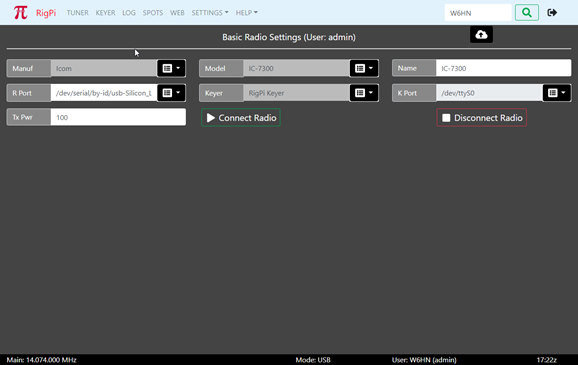Two Radio Settings options are provided in the RigPi SETTINGS Menu. Basic Radio settings take advantage of the Hamlib default settings for each radio. If you have made changes to the radio default Baud rate, stop bits, or RTS/DTR settings in your setup, use Advanced Radio settings. Advanced Radio settings also provide additional troubleshooting aids.

Most settings options use a drop-down list of options. Click the down arrow on the right end of an option that uses a list from which to choose. Click the option you wish to set and that option appears in the settings box. Boxes that are filled from drop down lists are gray since they cannot be filled manually.
To save changes, click the cloud up arrow at the top of the window. Use Disconnect Radio followed by Connect Radio to apply changes. Connect Radio also saves changes before applying them.
Function |
Label |
Notes |
|---|---|---|
Radio Manufacturer |
Manuf |
Select the company that manufactured your radio. A special "Hamlib" manufacturer can be used for special purposes, see the Technical>Sharing Radios, Rotors and Keyers topic. |
Radio Model |
Radio |
Once you have selected a Manufacturer, the Model list shows all supported models from that manufacturer. |
Radio Name |
Name |
Enter the name you want to use for this radio. This radio name appears in the Tuner window, in many alert dialogs, and in your log. The Model name is added to the Name box automatically, but you can change it. For example, the model MARK-V FT-1000MP appears in the Yaesu list. You can change the Radio Name to MV 1000MP, to shorten the name. |
Radio Port |
R Port |
The Port drop-down list shows all active ports connected to serial devices through a USB port. If you have a single radio connected to RigPi, there will be one long and one short entry in the list. With more than one radio or serial device, pull the radio USB connector out, refresh the page, and see what port is missing. Rebooting RSS can cause the short port names to change. so use the equivalent long name which does not change. The short ttyUSB ports are listed along with long names. The long 'by-id' name for all serial ports is included as shown in the screen shot for Advanced Radio, above.
The port can be directed to another RigPi which is controlling the radio. See Radio Advanced Settings. |
CW Keyer |
Keyer |
Select RigPi Keyer, via CAT, WinKeyer, External CTS, or None from the drop-down list. RigPi Keyer is available for one account but can be shared. Other accounts can share an assigned RigPi Keyer, or choose one of the other options. The WinKeyer option is used for a standalone K1EL WinKeyer connected through a USB port. See the Keyer Settings topic for more information about Rig, Pi Keyer and WinKeyer. |
K(eyer) Port |
CW Port |
RigPi Keyer uses /dev/ttyS0 for control. Via CAT does not require a separate port, it uses the radio port. WinKeyer and CTS External require a separate USB port. The CW Port can be redirected to another RigPi, see Radio Advanced Settings. |
Transmitter Power |
TX Pwr |
The default power level used by your transmitter. This value is used in logging. |
Connect Radio |
Connect Radio |
Connect the defined radio and keyer to RigPi. The Connect Radio button also saves any changes you have made in settings. If you change to another radio or different settings, Connect Radio disconnects the current radio and connects the specified radio. |
Disconnect Radio |
Disconnect Radio |
Disconnects the defined radio and keyer. |